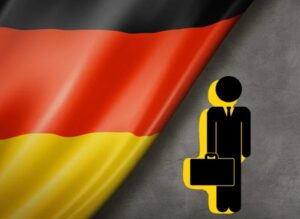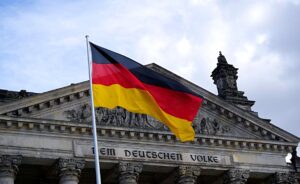
Economic experts predict a further decline in inflation in Germany in the second half of 2025. The main factors contributing to this are:
Lower energy prices
Stronger euro
Slower wage growth
Lower external demand due to trade tensions
Thus, inflation in Germany in January-May 2025 shows a steady downward trend, approaching the ECB’s target level. This creates the conditions for monetary policy easing and supports expectations of economic stability in the second half of the year.
Impact on monetary policy
The slowdown in inflation in Germany and other eurozone countries is strengthening expectations of interest rate cuts by the ECB. In May 2025, inflation in the eurozone stood at 2.1%, in line with the ECB‘s target.
The ECB is expected to decide at its meeting on June 4–5, 2025, to lower its key interest rate by 0.25 percentage points to 2.0%. This will be the eighth rate cut since June 2024, when it stood at 4.0%.

At the beginning of 2025, the German labor market is showing resilience despite economic challenges, including slowing GDP growth and structural changes in industry. However, problems such as a shortage of skilled workers, demographic changes, and difficulties with integrating migrants remain.
Key indicators at the beginning of 2025
Total employment: According to the Federal Statistical Office of Germany, the number of people in employment in March 2025 was around 45.8 million, 0.1% less than in March 2024.
Unemployment rate: In March 2025, the unemployment rate was 3.7%, up 0.2 percentage points compared to the same month of the previous year.
Average working week: Despite high employment, the average number of hours worked per employee fell to a record low (excluding the pandemic year of 2020), raising concerns about labor productivity.
Professions in demand
In 2025, there will continue to be high demand in Germany for specialists in the following fields:
Medicine: doctors, nurses, pharmacists.
Information technology: software developers, cybersecurity specialists, data analysts.
Construction: engineers, architects, skilled workers.
Education: teachers, especially in primary schools and technical subjects.
Care sector: social workers, caregivers, especially in the context of an aging population.
The shortage of personnel in these sectors is due to both demographic changes and an insufficient influx of qualified specialists.
Migration plays a key role in maintaining Germany’s labor force:
Number of foreign workers: As of 2024, the number of foreign workers in Germany stood at 6.3 million, almost twice as many as ten years ago.
Main migrant groups:
Ukraine: Since the start of the conflict in 2022, Germany has taken in a significant number of Ukrainian refugees, many of whom are integrating into the labor market.
Syria, Turkey, Afghanistan: These migrant groups are actively participating in the economy, especially in sectors with labor shortages.
Integration challenges: Despite integration efforts, migrants face challenges including recognition of qualifications, language barriers, and limited access to educational programs.
Average wage
Average wage: In 2025, the average gross wage in Germany is around €4,200 per month.
Minimum wage: From 2025, the minimum hourly rate has been increased to €12.82.
Sectoral differences:
IT and technology: high wages reflecting a shortage of skilled workers.
Medicine: salaries vary depending on specialization and region.
Construction and care: salaries remain competitive, especially given the shortage of labor.
Forecasts and challenges
Germany faces a number of structural challenges in the labor market:
An aging population: According to forecasts, around 4.8 million baby boomers will retire by 2035, exacerbating the labor shortage.
Reduction in working hours: The average number of hours worked per employee is declining, which could have a negative impact on overall productivity.
Integration of migrants: Additional measures are needed to effectively integrate migrants into the labor market, including recognition of qualifications and language support.
In response to these challenges, the German government is implementing programs to attract skilled workers from abroad, improve working conditions, and promote employment among women and older workers.
Source: http://relocation.com.ua/analysis-of-the-german-labor-market-at-the-beginning-of-2025-by-relocation/

The Ukrainian brand Smakuli (Lviv) — gluten-free cookies and snacks — is now available in German Rewe supermarkets, according to the Amal Berlin portal.
“We initially built our portfolio in Ukraine and have already implemented international quality and safety standards FSSC 22000, as well as AOECS certification, which certifies that allergens are carefully controlled in production. But that wasn’t enough – the process of entering the German market took almost 11 months,” the publication quotes Ruslana Rymarska, founder of the Smakuli brand and head of the Ukrainian Food Manufacturers Alliance (UFMA).
The Ukrainian company gained the opportunity to be represented in the Rewe network as part of the Startup Lounge project, which offers small businesses and startups the opportunity to introduce their products to the network.
According to Rymarska, work is currently underway to enter the Dutch and Swedish markets.

In 2025, Germany’s economy continues to face serious challenges. After two consecutive years of GDP decline (0.3% in 2023 and 0.2% in 2024), the current year is characterized by stagnation, with GDP growth forecast at 0.0%. This makes Germany the only G7 country that has not shown economic growth in the last three years.
The new government led by Chancellor Friedrich Merz, who is due to take office on May 6, is expected to present a package of measures to stimulate the economy. These include
Economists predict a moderate recovery of the German economy in 2026 with GDP growth of around 1.0%. However, the successful implementation of these forecasts will depend on the new government’s ability to effectively address internal and external challenges.

Germany topped the list of leading beer exporters to China in the first quarter of this year (by $23.258 million), according to the State Customs Administration (SCA) of the PRC.
It was followed by the Netherlands (by $11.799 million), Belgium (by $11.239 million), and Spain (by $10.028 million). Among Asian countries, Japan supplied the most beer to China – by $5.276 million.
In total, in January-March 2025, China imported beer from 52 countries and exported it to 89.

The Index of Economic Expectations of Investors and Analysts in Germany for the next six months, calculated by the ZEW Research Institute, fell to the lowest since July 2023 of minus 14 points in April from the highest since February 2022 of 51.6 points a month earlier. This is the most significant drop since March 2022. Analysts on average expected it to decline to 9.5 points in April, according to Trading Economics.
“Global uncertainty has increased dramatically, not only because of the possible effects of the [US] mirror duties on world trade, but also because of the dynamic nature of their changes,” said ZEW President Achim Wambach. ”This is especially affecting export-intensive industries such as the automotive and chemical industries, as well as the production of metals, machinery and steel, which have recently seen significant improvements.
Meanwhile, the indicator of attitudes toward the current situation in Germany increased to minus 81.2 points this month from minus 87.6 points in March.
In the eurozone, the index of economic expectations in April fell to the lowest since December 2022, minus 18.5 points from 39.8 points a month earlier. The experts’ forecast for this indicator was 14.2 points.
The indicator for assessing the current economic situation in the currency bloc decreased by 5.7 percentage points to minus 50.9 points.
Source: http://relocation.com.ua/index-ekonomichnyh-ochikuvan-investoriv/